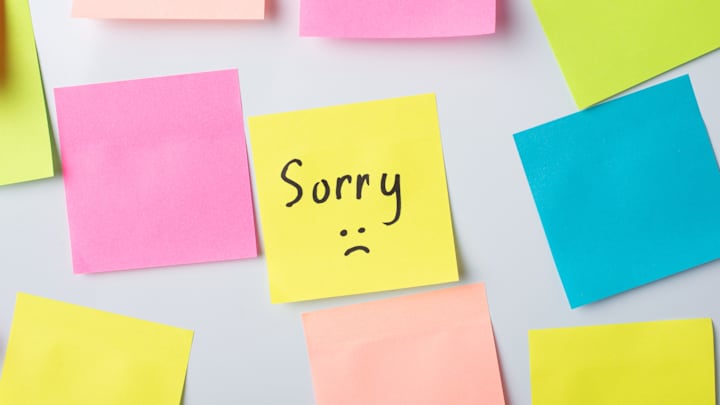Even if you didn’t study a lick of Latin in school, you might’ve guessed the phrase mea culpa came from the language. After all, English has borrowed quite a few Latin phrases over the years. This one is used as an apology. But while I’m sorry doesn’t necessarily convey that whatever happened is your fault, mea culpa does.
The term hails from an old Roman Catholic prayer of confession known as the Confiteor. (The first word of the prayer is Confiteor, which literally means “I confess.”) Though there are a number of versions of the Confiteor across multiple Christian religions, you’ll typically see this line in the more traditional iterations: meā culpā, meā culpā, meā maximā culpā.
Without accent marks or context, this could simply be translated as “my fault, my fault, my greatest fault.” But with both those components, it’s a more nuanced phrase—often translated as “Through my fault, through my fault, through my most grievous fault.” (Some translations drive the point home by using “through my own fault.”)
According to the Oxford English Dictionary, people were exclaiming “Mea culpa!” outside of the prayer as far back as the early 13th century. Geoffrey Chaucer even mentioned it in his epic poem Troilus & Criseyde, written sometime around 1385: “Now, mea culpa, lord! I me repente.” For the next several centuries, mea culpa continued to be used as an interjection; much like you’d say “My bad!” or even just “My fault!”
Then, in the 20th century, English speakers began using mea culpa as a noun that could describe any personal acknowledgement of guilt, fault, or error. This sense often pops up in relatively formal scenarios—if, for example, a politician admits wrongdoing in a public statement, the media might say they “issued a mea culpa.” If your partner utters an offhand “I’m sorry” after forgetting to buy lemons, on the other hand, you may not feel like such a casual apology counts as a mea culpa. Though maybe if they said “Now, mea culpa, lord! I me repente” instead, you’d feel differently.
